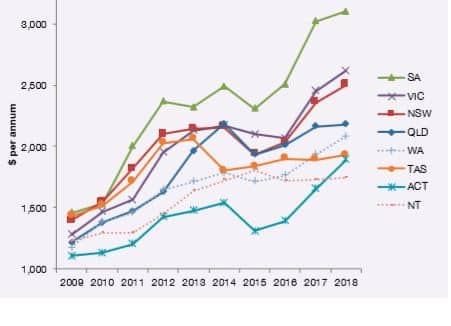A new electricity consumer report from the St Vincent de Paul Society shows electricity price standing offers in the eastern states have risen on average 75 per cent since 2009.
Vinnies’ Tariff-Tracking Project examines the impact of energy prices on Australian households each year. The project also aims to improve community awareness and understanding of tariffs, so consumers can find better energy plans.
The society believes a competitive market to be good in itself, but that its execution in Australia has been poor.
Standing offers prices up, discounts not always beneficial
The research behind the latest report shows ‘standing offers’ (base rates) have increased nationally, with South Australia and Victoria hardest hit.

It also shows that retailer discounts are not always beneficial. For example, retailers frequently change their discount offers. There often appears to be no real basis for the fluctuating rates, and to consumers they can seem “arbitrary”.
Pay-on-time discounts can also be of limited benefit. That’s because if a customer switches energy companies they can forego up to three months of discounts with their current provider. In effect this turns discounts into “de facto exit fees”.
Energy bills a ‘confusion-opoly’ for consumers
Co-author of the report Gavin Dufty told ABC News that consumers could save a lot of money by negotiating better deals with their energy providers.
He said many people were sticking with standing offers because of confusion over bills, describing the market as a “confusion-opoly”.
He urged customers to actively engage with the market, rather than simply accepting the prices they are paying.
Dufty also advised households not to expect the government to look after them. Instead, by engaging with the market they could save themselves $500 or more per year on their bills.
How consumers can take more control of costs
The focus of the report is largely that consumers need to take control of their energy costs through negotiation rather than just meekly accepting the standing offers.
However, another way to gain energy independence and save money is through a home solar installation.
By installing solar panels, a household can generate its own electricity and reduce energy costs. In addition, any excess energy produced could be either stored in a solar battery or sold back to the grid, generating further savings.













































